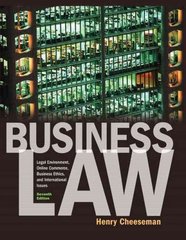Question
Question 1: Economic theory asserts that A. the implicit cost of capital should be ignored in making a decision. B. the use of scarce resources,
Question 1: Economic theory asserts that
A. the implicit cost of capital should be ignored in making a decision.
B. the use of scarce resources, whether one owns the resource or one has to buy it, always results in a cost.
C. costs incurred in the future should be ignored in making a decision.
D. benefits incurred in the future should be ignored in making a decision.
Question 2: Economic theory asserts that
A. only implicit costs are relevant in decision-making.
B. only explicit costs are relevant in decision-making.
C. a cost to be incurred in the future should count more heavily than a cost incurred today.
D. both implicit costs and explicit costs are relevant in decision-making.
Question 3: To the extent that a firm incurs an implicit cost of capital,
A. its explicit costs will be zero.
B. the firm is incurring no opportunity costs.
C. its accounting profit will be less than its economic profit.
D. its economic profit will be less than its accounting profit.
Question 4: Compared to other regions of the country, a smaller fraction of the land resources is used for agriculture.One reason that there is so little agricultural land left in New England is that,
A. the government is reclaiming the land for urban development.
B. the land has been contaminated by pesticides.
C. there is a large implicit cost of capital in not selling agricultural land to real estate developers.
D. all of the above.
Question 5: John owns and operates a small business that provides economic consulting services.During the year he spends $55,000 on travel to clients and other expenses, and the computer and other office equipment that he owns depreciates by $2,000.If he didn't use the computer and other office equipment, he could sell it and earn yearly interest of $100 on the money created through this sale.John's total revenue for the year is $100,000.Instead of working as a consultant for the year, he could teach economics at a small local community college and earn an annual salary of $50,000.
A. $45,000
B. $43,000
C. $43,100
D. -$7100
Question 6: John's economic profit is
A. $43,000
B. $42,900
C. -$7000
D. -$7100
Question 7: Should John continue working as a consultant, or should he teach economics instead?
A. John's accounting profit is positive.He should continue to operate the consulting business.
B. John's accounting profit is negative.He should give up the consulting business and teach economics.
C. John's economic profit is negative.He should give up the consulting business and teach economics.
D. John's economic profit is positive.He should continue to operate the consulting business.
Question 8: Jackie owns and operates a web-design business.Her computing and other equipment depreciates by $5,000 per year.She runs the business out of a room in her home.If she didn't use the room as her business office, she could rent it out for $2,000 per year.Jackie knows that if she didn't run her won business, she could return to her previous job at a large software company that would pay her a salary of $60,000 per year.Jackie has no other expenses.
A. $5,000
B. $67,000
C. $69,000
D. $62,000
Step by Step Solution
There are 3 Steps involved in it
Step: 1

Get Instant Access to Expert-Tailored Solutions
See step-by-step solutions with expert insights and AI powered tools for academic success
Step: 2

Step: 3

Ace Your Homework with AI
Get the answers you need in no time with our AI-driven, step-by-step assistance
Get Started


